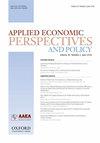我们是否准确地衡量了影响?在评估推广人员和项目时,识别潜在的偏见来源
IF 3.4
2区 经济学
Q2 AGRICULTURAL ECONOMICS & POLICY
引用次数: 0
摘要
农业推广项目必须证明其价值,以争取有限的政府资金。当扩展专业人员测量他们的程序的价值时,存在这样的风险,即他们报告的信息将提供有偏见的或不准确的价值度量。我们检查了推广项目和推广人员的评估过程,以确定潜在的偏见或不准确的来源。我们发现,项目评估中的偏见和不准确往往源于对短期结果的关注,而不是对长期影响的关注,而人员评估中的偏见可能源于扩展人员与其评估人员之间存在的信息不对称。本文章由计算机程序翻译,如有差异,请以英文原文为准。
Are we measuring impact accurately? Identifying potential sources of bias in the evaluation of extension personnel and programs
Agricultural extension programs must demonstrate their value to compete for limited government funding. As extension professionals measure the value of their programs, the risk exists that the information they report will provide a biased or an inaccurate measure of value. We examine the evaluation process for extension programs and extension personnel to identify potential sources of bias or inaccuracies. We find that bias and inaccuracy in program evaluation often stems from a focus on short-term outcomes, rather than long-term impacts, while bias in personnel evaluation can result from information asymmetries that exist between extension personnel and their evaluators.
求助全文
通过发布文献求助,成功后即可免费获取论文全文。
去求助
来源期刊

Applied Economic Perspectives and Policy
AGRICULTURAL ECONOMICS & POLICY-
CiteScore
10.70
自引率
6.90%
发文量
117
审稿时长
>12 weeks
期刊介绍:
Applied Economic Perspectives and Policy provides a forum to address contemporary and emerging policy issues within an economic framework that informs the decision-making and policy-making community.
AEPP welcomes submissions related to the economics of public policy themes associated with agriculture; animal, plant, and human health; energy; environment; food and consumer behavior; international development; natural hazards; natural resources; population and migration; and regional and rural development.
 求助内容:
求助内容: 应助结果提醒方式:
应助结果提醒方式:


